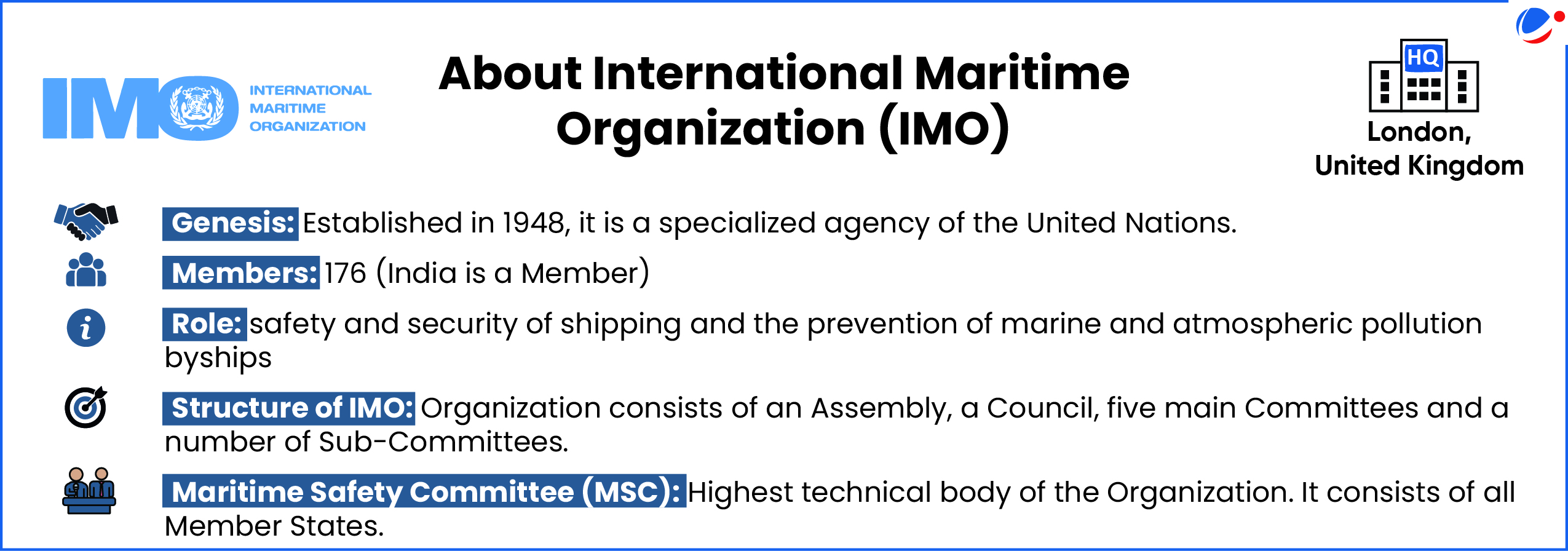India has urged International Maritime Organization (IMO) for Comprehensive Investigation and Global review of recent Maritime Incidents.
More on the News
- Due to rise in number of incidents of vessel sinking and fires off the Indian coast, India has requested IMO to enhance container safety and cargo disclosure regulations at IMO's Maritime Safety Committee (MSC).
- It also drew IMO's attention towards improving global standards around packaging, declaration, and monitoring of lithium-ion batteries and other dangerous goods categorized under International Maritime Dangerous Goods (IMDG) Code.
Maritime Disasters
- Maritime disasters encompass a wide range of incidents, including shipwrecks, collisions, groundings, fires, explosions, and oil spills.
- New types of risks include transport of hazardous chemical products, dangerous cargo, nuclear wastes, submarines and weapons, etc.
- Recent Maritime Incidents:
- Sinking of Liberian-flagged vessel MSC ELSA 3 (Kochi coast):
- After the accident, Tiny plastic pellets, known as 'nurdles', were found in large numbers along the coast of Thiruvananthapuram.
- Classified as primary microplastics, these pellets (Between from 1 mm to 5 mm in diameter) can lead to habitat contamination and breaking into micro and nano plastics and entering food chain.
- After the accident, Tiny plastic pellets, known as 'nurdles', were found in large numbers along the coast of Thiruvananthapuram.
- Fire aboard MV Wan Hai 503 (Kerala Coast): Cargo of ship included calcium carbide, plastic pellets, heavy fuel oil etc. raising serious environmental concerns.
- Sinking of Liberian-flagged vessel MSC ELSA 3 (Kochi coast):
- Consequences
- Environment: Marine pollution such as oil spills, plastic nurdles, loss of biodiversity, ballast water contamination, etc.
- Health: Toxic exposure from chemicals/oil can cause long-term health issues for cleanup workers and locals, etc.
- Economic loss and safety: Devaluation of the shores, beach cleanup operations, loss of coastal livelihoods, deteriorating tourism, etc.
Challenges in handling Maritime Incidents/Disasters
- Inadequate Transparency in Cargo Declaration: Shippers often fail to properly disclose or even misdeclare the nature of goods, making it difficult for authorities to assess and mitigate risks.
- Improper Handling of Hazardous Materials: Mishandling of hazardous items increases fire and environmental risks. Further, the lack of standardized practices in packaging and storage exacerbates the problem.
- Complex ship ownership and management structures: (e.g., Liberia-flagged, German-owned, Cyprus-managed) dilute responsibility and weaken accountability.
- Delayed Global Response and Regulatory Action: There is no urgent global mechanism to investigate such incidents and revise safety protocols. Regulatory reform is reactive rather than preventive.
- Insurance Claims: Maritime insurance policies can be complex, and disputes may arise regarding coverage, liability, and the apportionment of costs.
Role of the IMO in Maritime Safety and Environment Protection
Legal Mechanism related to Maritime Disaster in India:
|
Way Forward
- Prevention Strategies
- Strict Regulation of Shipping: Strict enforcement of SOLAS convention and MARPOL regulations at the global level; monitor Indian waters more effectively as per the Merchant Shipping Act provisions.
- Risk Mapping & Zoning: Identify ecologically sensitive zones (e.g., CRZ, mangroves) and restrict oil transport nearby.
- Role of Technology & Transparency in cargo management: Electronic cargo tracking systems, Real-time monitoring of dangerous goods & Blockchain-based disclosures.
- Reforms in IMO Regulations: Mandating full disclosure of beneficial ownership, enhanced flag state obligations, and clearer delineation of managerial versus operational control responsibilities.
- Detection and Early Warning:
- Use coastal radars, drones, and satellites like ISRO's RISAT for surveillance.
- Mandate Automatic Identification Systems (AIS) on vessels to track movement in Indian waters.
- Polluter Pays Principle: Implement liability rules under Indian and international laws to hold ship owners accountable.
- Out of the court settlements and maritime negotiation and arbitration: To resolve maritime dispute expeditiously.
- Training & Awareness: Capacity-building programs for port authorities and fishermen.







